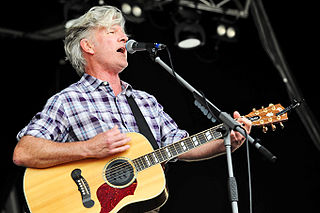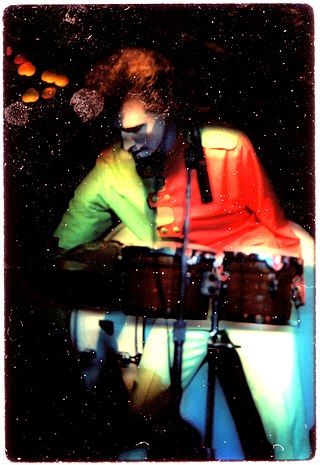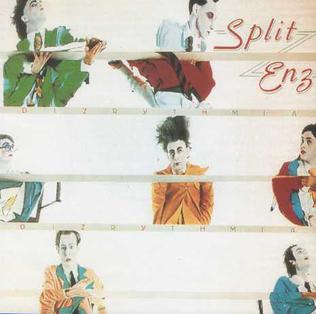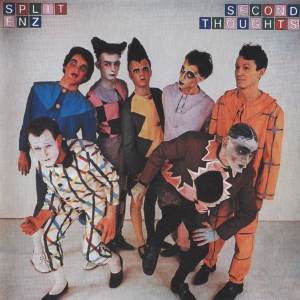
Split Enz were a New Zealand rock band formed in Auckland in 1972 by Tim Finn and Phil Judd. The band underwent many lineup changes, with sixteen members across their twelve year history. Originally started as a folk-oriented group with quirky art rock stylings, the band built a strong regional following, noted for their outlandish costumes, makeup and theatrical performances. After three singles, the band released their first album, Mental Notes, in 1975, which displayed strong progressive rock elements. The group's third album, 1977's Dizrythmia, was the first without Judd, with Tim Finn's brother Neil replacing him on guitar and eventually as co-lead vocalist and songwriter, after which the band came to embrace a more streamlined and pop-oriented approach and became pioneers of new wave. The band achieved worldwide indie stardom in the 1980s, with particular success in New Zealand, Australia and Canada.

Brian Timothy Finn is a New Zealand singer and musician. His musical career includes forming 1970s and 1980s New Zealand rock group Split Enz, a number of solo albums, temporary membership in his brother Neil's band Crowded House and joint efforts with Neil Finn as the Finn Brothers.

Geoffrey Noel Crombie is a New Zealand percussionist and former member of the band Split Enz. He fulfilled multiple roles including costume and hair designer, singer, album cover designer, and music video director. Prior to Split Enz, Crombie worked as a postal assistant and was also an artist. He attended Mana College and then moved to Auckland to study art at Elam School of Fine Arts.
Nigel Griggs is a musician who played bass guitar in Split Enz. He is the brother of Paul Griggs from the 1970s vocal group Guys 'n' Dolls. A professional musician since 1963, Nigel Griggs played in a number of bands, notably The Cortinas and Octopus, 1963–1971, with his brother Paul, Carmen and Steve Hillage's Khan.
Schnell Fenster were a New Zealand rock band formed in Melbourne, Australia in 1986 by Noel Crombie on drums and percussion, Nigel Griggs on bass guitar and backing vocals, Phil Judd on lead vocals and guitar, and Eddie Rayner on keyboards and piano – who were all former members of New Zealand-formed rock group, Split Enz. Fellow founder, Michael den Elzen on lead guitar had worked with Tim Finn Band, another band formed by a Split Enz alumnus. Judd's band were briefly named The Wanx: but Rayner soon left and they changed their name to faux-German for "quick window", because it "appealed to [their] perversity". The group formed the core members of Noel's Cowards, a short-term ensemble, whose sole output was six tracks for the soundtrack of a feature film, Rikky and Pete, in 1988. Schnell Fenster released two studio albums, The Sound of Trees (1988) and Ok Alright a Huh Oh Yeah (1990), before disbanding in 1992. At the ARIA Music Awards of 1989 they were nominated for Breakthrough Artist – Album for The Sound of Trees, Breakthrough Artist – Single for "Whisper" and Best Cover Art for Judd's graphic art.

Dizrythmia (1977) is the third studio album released by New Zealand new wave band Split Enz. It was the first Split Enz album without co-founding members Phil Judd and Mike Chunn. Neil Finn and Nigel Griggs, the first being the younger brother of band leader Tim Finn, replaced them respectively. Meanwhile, Nigel's old friend and former bandmate Malcolm Green took the place of Emlyn Crowther, who also left around this time. The album was released domestically by Mushroom Records, and overseas by Chrysalis Records.

Mental Notes is the debut studio album by New Zealand band Split Enz. The album cover was painted by band member Phil Judd. Original vinyl copies featured Judd saying "Make a mental note" in the runout groove of the record's second side, causing the phrase to be looped ad infinitum on manual turntables until the stylus is removed.

Second Thoughts is the second studio album by New Zealand art rock band Split Enz. It was recorded in London with Roxy Music's guitarist Phil Manzanera producing the album.
Philip Raymond Judd is a New Zealand singer-songwriter known for being one of the founders of the bands Split Enz and The Swingers.

Big Canoe is the second studio album released by former Split Enz frontman Tim Finn in April 1986. The album peaked at number 3 in New Zealand and number 31 in Australia.

The Rootin Tootin Luton Tapes is a collection of demos made by New Zealand band Split Enz in 1978. During their 2006 tour of Australia it was announced that these recordings would finally be released as an official album after lengthy pressure from the fan club Frenz of the Enz.
Oddz and Enz is a 1992 album by Split Enz. Composed mainly of live recordings during the Mental Notes period, the album also contains two non-album singles, a b-side and a demo recording.

"I See Red" is a 1978 song by New Zealand art rock group Split Enz. It was released in December 1978 as the lead single from their studio album Frenzy.
"Late Last Night" was a single originally recorded by New Zealand band Split Enz in Australia in 1976. Written by Phil Judd, it was accompanied by the band's first promotional video clip. The single was a minor hit on the Australian Top 100, reaching number 93.

Spellbound, very often subtitled on the cover as "The Very Best Of Split Enz", is a 1997 compilation album by New Zealand rock band Split Enz. Apparently intended to be the final word on Split Enz compilations, it is the band's most comprehensive career survey. Featured amongst the album's 39 tracks are all the hits, live favourites, choice album tracks and a few rarities, all selected by members of the band.
Enz of an Era was a compilation by New Zealand rock band Split Enz. Released to mark the band's 10th anniversary, and composed of tracks selected by members of the band, the album was released in New Zealand and Australia only. The album was followed up by two "Enz Of An Era" 10th anniversary concerts in early 1983.

The Best of Split Enz is a compilation by New Zealand rock band Split Enz, and not to be confused with History Never Repeats – The Best of Split Enz. Mainly featuring tracks from the 1976–1983 period, the album was released in the UK, the Netherlands and the US only.
One Out Of The Bag is a DVD/CD live release by New Zealand Rock music band Split Enz. It was recorded during their 2006 tour of Australia. This is also the first Split Enz release since Waiata/Corroboree to feature drummer Malcolm Green, who was sacked shortly before Waiata/Corroboree's release. Green shares drum duties with percussionist Noel Crombie.
Beginning of the Enz is a compilation album by New Zealand rock group Split Enz. Released in the UK by Chrysalis Records, it compiles tracks from the albums Second Thoughts (1976) and Dizrythmia (1977), as well as the non-album single "Another Great Divide" (1977). Despite its almost identical title, the album bares a completely different track listing to the 1979 Split Enz album The Beginning of the Enz, which comprised non-album singles and demos from 1973 to 1974.











